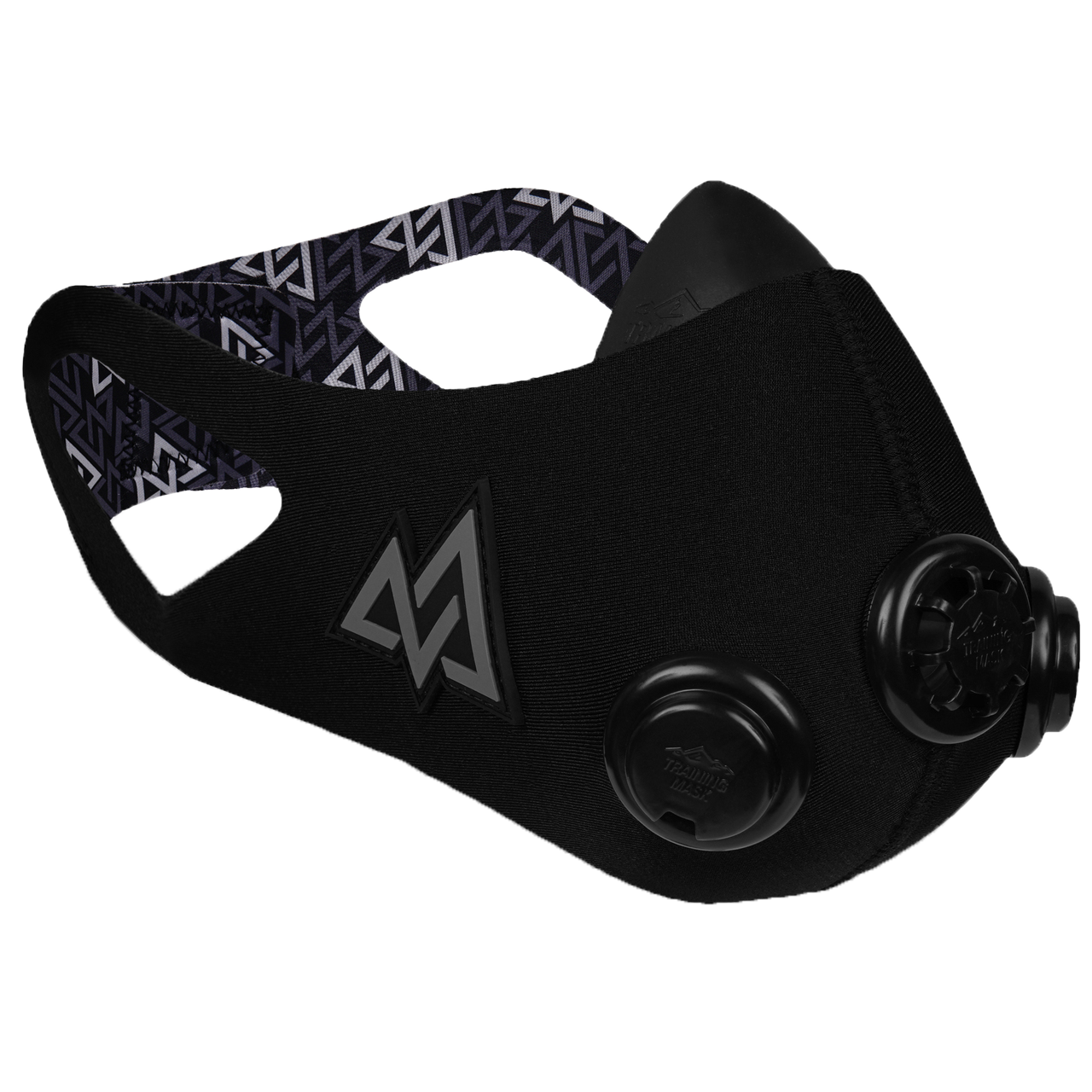How TrainingMask Works
Potential Medical Applications
ASTHMA
Resistance breathing, such as the use of resistance breathing trainers, can provide valuable benefits for individuals with asthma.
Asthma is a chronic respiratory condition characterized by airway inflammation and bronchoconstriction, leading to difficulty in breathing.
Resistance breathing trainers can help strengthen the respiratory muscles, including the diaphragm and intercostal muscles, which play a crucial role in breathing.
By regularly using these trainers, individuals with asthma can improve the strength and endurance of their respiratory muscles, making them more efficient in overcoming airway resistance. Additionally, resistance breathing trainers can assist in training the inspiratory muscles to generate higher inspiratory flows, which can be beneficial during episodes of bronchoconstriction.
Strengthening the respiratory muscles and improving their function may help individuals with asthma achieve better control over their breathing, reduce the frequency and severity of asthma symptoms, and enhance overall respiratory health. However, it is essential for individuals with asthma to consult with a healthcare professional or asthma specialist before incorporating resistance breathing trainers into their management plan to ensure proper usage and suitability for their specific condition.
Disclaimer: The following claims have not been evaluated by the FDA (U.S. Food and Drug Administration). The information provided is for educational and informational purposes only and should not be considered as medical advice or a substitute for professional medical guidance. The effectiveness, safety, and potential benefits of any products or interventions mentioned have not been confirmed by the FDA. Individuals should consult with a qualified healthcare professional or medical provider before making any changes to their healthcare routine or starting any new treatments. The FDA plays a vital role in evaluating the validity of health claims, and it is important to rely on their assessments and recommendations for informed decision-making regarding healthcare products and interventions.
CHRONIC OBSTRUCTIVE PULMONARY DISEASE (COPD)
Resistance breathing trainers can offer potential benefits for individuals with Chronic Obstructive Pulmonary Disease (COPD), a chronic respiratory condition characterized by airflow limitation.
COPD leads to reduced lung function and weakened respiratory muscles, making breathing more difficult. Resistance breathing trainers, such as inspiratory muscle trainers, can help strengthen the inspiratory muscles involved in breathing.
By providing resistance during inhalation, these trainers make the respiratory muscles work harder, improving their strength and endurance. This can lead to enhanced lung capacity, improved respiratory muscle function, and better overall breathing efficiency in individuals with COPD. Regular use of resistance breathing trainers may help individuals with COPD increase their exercise tolerance, reduce breathlessness, and improve their ability to perform daily activities.
However, it is crucial for individuals with COPD to consult with a healthcare professional or a pulmonary specialist before incorporating resistance breathing trainers into their treatment plan to ensure proper usage and to determine if they are suitable for their specific condition.
Disclaimer: The following claims have not been evaluated by the FDA (U.S. Food and Drug Administration). The information provided is for educational and informational purposes only and should not be considered as medical advice or a substitute for professional medical guidance. The effectiveness, safety, and potential benefits of any products or interventions mentioned have not been confirmed by the FDA. Individuals should consult with a qualified healthcare professional or medical provider before making any changes to their healthcare routine or starting any new treatments. The FDA plays a vital role in evaluating the validity of health claims, and it is important to rely on their assessments and recommendations for informed decision-making regarding healthcare products and interventions.
POSTOPERATIVE PULMONARY COMPLICATIONS
Resistance breathing training can be beneficial for individuals recovering from postoperative pulmonary complications. After surgery, patients may experience reduced lung function, weakened respiratory muscles, and impaired breathing mechanics. Resistance breathing trainers, such as inspiratory muscle trainers, can assist in strengthening the respiratory muscles involved in inhalation. By creating resistance during breathing, these trainers encourage the respiratory muscles to work harder, promoting their rehabilitation and recovery. Regular use of resistance breathing trainers can help improve lung capacity, enhance respiratory muscle strength and endurance, and facilitate a faster return to normal respiratory function following surgery. It is essential for individuals with postoperative pulmonary complications to consult with their healthcare provider or a respiratory therapist to determine the appropriate timing and usage of resistance breathing trainers in their specific recovery plan. The healthcare team can provide guidance on incorporating resistance breathing training safely and effectively to support postoperative pulmonary rehabilitation.
Disclaimer: The following claims have not been evaluated by the FDA (U.S. Food and Drug Administration). The information provided is for educational and informational purposes only and should not be considered as medical advice or a substitute for professional medical guidance. The effectiveness, safety, and potential benefits of any products or interventions mentioned have not been confirmed by the FDA. Individuals should consult with a qualified healthcare professional or medical provider before making any changes to their healthcare routine or starting any new treatments. The FDA plays a vital role in evaluating the validity of health claims, and it is important to rely on their assessments and recommendations for informed decision-making regarding healthcare products and interventions.
UNDERSTANDING THE BENEFITS OF RESISTANCE BREATHING
Resistance breathing training offers a range of benefits that can enhance respiratory function, improve athletic performance, and contribute to overall well-being. Here are three paragraphs highlighting the advantages of resistance breathing:
- Improved Respiratory Muscle Strength and Endurance: Resistance breathing training targets the inspiratory muscles, including the diaphragm and intercostal muscles. By creating resistance during inhalation, these trainers make the respiratory muscles work harder, leading to increased strength and endurance. This enhanced muscular capacity allows for more efficient breathing, improved oxygen uptake, and reduced fatigue during physical activities. Stronger respiratory muscles also contribute to better posture and support overall respiratory health.
- Enhanced Lung Function and Capacity: Regular use of resistance breathing trainers can result in improved lung function and increased lung capacity. By engaging the respiratory muscles in resistance training, individuals can expand their lung volume and improve the efficiency of oxygen exchange. This can be particularly beneficial for athletes and individuals engaged in aerobic activities, as it allows for better oxygen delivery to working muscles, increased endurance, and reduced shortness of breath during exertion. Additionally, enhanced lung function can benefit individuals with respiratory conditions, such as asthma or chronic obstructive pulmonary disease (COPD), by promoting better breathing control and overall respiratory health.
- Performance Enhancement and Adaptation: Resistance breathing training can positively impact athletic performance and physical conditioning. By challenging the respiratory muscles, these trainers improve the body's ability to handle increased physical demands. This leads to improved cardiovascular fitness, enhanced respiratory efficiency, and increased stamina. Athletes, from runners to weightlifters, can benefit from resistance breathing training as it helps optimize oxygen utilization and enhances overall performance. Additionally, resistance breathing can aid in acclimatization to high-altitude environments by simulating reduced oxygen conditions and stimulating adaptations that improve oxygen transport and utilization.
It's important to note that individual responses to resistance breathing training may vary, and the benefits can depend on factors such as training consistency, intensity, and individual physiology. It is advisable to consult with a healthcare professional or qualified trainer to develop a customized resistance breathing training program tailored to specific goals and needs.


